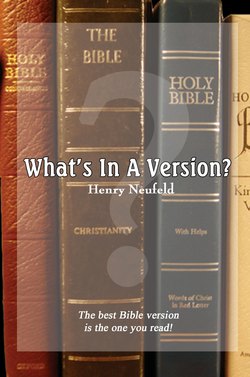Читать книгу What's in a Version? - Henry E. Neufeld - Страница 12
На сайте Литреса книга снята с продажи.
How Large was Nineveh?
Оглавление| Jonah 3:3 |
| We - NINeWEH HAYeTHAH ;IYR GeDOLAH And Nineveh was city big MAHaLĒK SHeLOSHETH YAMIYM (of) traveling three days |
| Now Nineveh was an exceedingly large city, a three days’ walk across. (NRSV) |
| Now Nineveh was a very important city—a visit required three days. (NIV [1984]) |
| Now Nineveh was a very large city; it took three days to go all through it. (NIV [1978]) |
The fact is that the site of Nineveh is about 1800 acres, or 2.8 square miles. The problem for the translator is that it is difficult to determine what a city “of three days journey” actually is. Since we know the approximate size of Nineveh, it’s hard to fit in. Before we knew, for example when the King James Version was translated, it was assumed it would take three days to travel across the city. The NRSV has chosen to continue following that tradition, even though it contradicts the known size of the city. One possibility here is storyteller’s license—making a somewhat exaggerated statement to get the audience’s attention. The first edition of the NIV Old Testament (1978) solved the problem by assuming that the three days journey would be to go all around in the city. The 1984 edition alters that to “visit” but also changes the translation of the Hebrew word “GeDOLAH”, which can mean “great, large or important” so that the verse no longer refers to the size of the city at all.
A translator’s concern will show through here. Does the translator wish to leave open the possibility of an error in scripture? Even though there may be perfectly good explanations for the expression as it is written, will these be understood by the readers?
Further study: Read the following text as Jonah starts his preaching after going a day’s journey into the city. Does that suggest anything about how verse three should be translated?
Controlled by the Spirit?
| Romans 8:6 |
| TO GAR PHRONĒMA TES SARKOS THANATOS The for mindset of the flesh death TO DE PHRONĒMA TOU PNEUMATOS ZÔE KAI EIRĒNĒ the but mindset of the spirit life and peace |
| To set the mind on the flesh is death, but to set the mind on the Spirit is life and peace. (NRSV) |
| The mind of sinful man is death, but the mind controlled by the Spirit is life and peace; (NIV) |
| If our minds are ruled by our desires, we will die. But if our minds are ruled by the Spirit, we will have life and peace. (CEV) |
The concern in these verses is to whether we understand the mind of the Christian to be controlled by the Holy Spirit, or whether the reference is to us setting our minds on the Spirit. Those who emphasize free will tend to prefer the translation of the NRSV, while those for whom free will is less important will often prefer the NIV.
